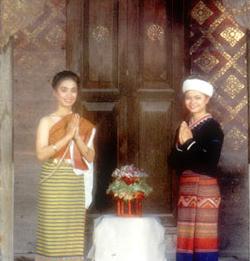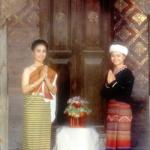Advice for visitors to Chiang Mai Thailand
Amidst the rolling foot hills of the Himalayan Mountains some 800 kilometers north of Bangkok is the culturally rich city of Chiang Mai, the longest continuously lived in settlement from the ancient days of Siam. Founded in 1296 AD it was isolated from Bangkok and could only be reached by an arduous river journey or an elephant back trip until the 1920's. Such isolation has helped keep Chiang Mai's distinctive charm intact up to the present day.
When you arrive in Chiang Mai, it helps to know a bit about transportation within the city. At the airport, train station, or bus station, you will probably be met by the representatives of various guest houses and hotels and tour operators. If you have a specific place in mind and you don't see the specific signboard, you can always call the place to have someone pick you up from the train station, airport, or bus arcade depot. Taxis are available at the airport, with a price of 150 baht to most destinations.
The common vehicles of public transportation are more varied than public buses. The terms 'dtoog dtoog' and 'sarmlor' are open-air, three-wheel vehicles, and 'zeelor' and 'songthaew' describe vehicles with four wheels. Whenever you get in a 'dtoog dtoog', 'zeelor', or 'samlor', you should make sure that they take you where you want to go. Often the drivers work on commission and may tell you that the place you want to go is dirty, closed, or full if they don't have a previous agreement with the place you have in mind. Always negotiate the price before you get in a dtoog dtoog or samlor. A zeelor ride should cost 15 Baht on a regular route, more if you hire it out to go somewhere out of the way.

The Songtaew
The best way to get around Chiang Mai is by 'songthaew'. These are covered pick-up trucks with two benches in the back. "Songthaew" means "two benches" in Thai. You will see them everywhere, and it's easy to get them to pick you up.
All you need to do is to put your arm out and look at the driver, and they will stop. Then tell the driver which street you want to go to, and if he is going that way, he will shake his head "yes"; if not, he will say "no" and go on. Don't worry-there will be another one right behind him. When the driver turns down the street you want, start looking for where you want to get off and press the switch located on the roof of the cab. The driver will pull over, let you out, and then you pay him.
The fare should be 20 Thai baht or less (around 50 cents). If you tell the driver a hotel or establishment, he will think you want to hire him for a private trip, and the price will be much more. Negotiate any price beforehand if you want to go to an establishment.
- The Thai people have several customs that are important to remember to avoid causing offense. Never touch the head, because it is the most sacred part of the body. The feet are the lowliest part, so don't point them at others or rest them above ground level. Never stop a rolling Thai Baht coin or any type of Thai currency with your foot, as the money here has a picture of the king on it.
Respect for the king and religious customs is another important part of Thai protocol. They have great respect for the royal family, the flag, and anything with an image of the king, including the money. When you visit a Buddhist temple, you should always remove your shoes before entering any buildings. Men should wear long pants, and women should wear knee-length or longer skirts. Women are not allowed to touch monks or make prolonged eye contact with them. Do not sit on the walls surrounding the jedee, which contains the temple's sacred relics of the Buddha.
Meeting and making friends with different people is an exciting part of travel anywhere. In Northern Thailand, it helps to know a bit of the language and something about the protocol. To say "hello", say "Sawasdee Krup" for men and "Sawasdee Kha" for women. To learn more Thai before you come, an excellent free teaching website can be found at http://www.learningthai.com/. You will gain loads of respect from the Thai people if you learn just the basics.The Thais put a lot of emphasis on manners, so it's a good idea to learn to say "Thank you". In Thai, it's "Kob Khun", followed by "Krup" or "Kha" for women. The "wai" made by placing your palms together in front of the upper chest is the traditional Thai gesture of greeting or respect, and the gesture is always appreciated. The custom is that younger people "wai" elders first, so let the children and persons you think are younger than you "wai" before you "wai" them.

The Thai WaiWhatever happens, though, don't display your anger, because the Thais will think you uncultured, and ranting will get you nowhere. Smile and think "no problem". Thais do not like confrontation, so getting angry will get you nowhere in Thailand. Here is an example:
Let's say you arrive at your hotel and want a nice, hot shower or bath. You turn on the tap and find the hot water is not working. What most people would do is call the front desk and complain, and if you are tired, you might raise your voice a little, saying, "The hot water doesn't work-what's the problem?" It might take a long time before someone comes to check it out, if at all. What you should do is say, "I don't know how to get the hot water turned on in my room; would you please have someone show me?" Someone will come to your room within a minute or two to check it out.
- Thailand is a country of gourmands. Eating out is one the nation's favorite activities, and knowing a bit of table manners will help you appear more civilized. Waiters and waitresses in Thailand are trained to take your entire order. When they take the order, they will often ask "one", which is their way of asking whether they got it correctly or not. The entire meal is customarily served at the same time, but the empty dishes are removed one by one. Some street-side restaurants will not remove any dishes or bottles until you finish your meal. This is because they do not write down your order. They shout your order to the cook, and after the meal, they will count the plates and bottles and figure out the bill then.
Chiangmai and the north have plenty of night entertainment available. It runs the gamut from restaurants to nightclubs, discos, or video bars. Thai people are often as interested in meeting you as you might be in meeting them, but one should exercise discretion and sometimes a bit of caution, especially in matters of the heart. In romantic situations, Westerners and Thais both occasionally get hurt. The best advice is to think with your head AND your heart. Enjoy yourself, but be very adult about any given situation.
North Thailand people are passionate when it comes to festivals unlike anywhere else in the Kingdom.
The 3 main festival are.
- The Loi Krathong Festival This festival is great for those who enjoy fireworks, parades and floats. Each year the festival is at a different date in October or November depending on the lunar calander. In 2008 the festival will be from November 8th through the 11th. Reservations need to be made early as people from all over the world come to join in the festivities. Here is an article I wrote about the festival and what it all means to the Thai people. You can also view a short streaming video of the "Khom Loy" celeration during the first evening of the Loi Krathong Festival. I am sure you have seen nothing like it. To be there in person is a real experience you will remember for a lifetime.
- The Chiang Mai Flower festival This is the Thailand version of the Rose Bowl Parade in the USA. Colorful floats made with colorful flowers, orchids and seeds are used. Wonderful traditional northern Thai costumes are worn by all and lovely girls and beauty queens adorn the floats. There are marching bands and country folk playing northern Thai music in the parade. The festival is always the first weekend in Feburary. On Saturday is the parade and on Sunday is the beauty pagent and displays of unique flowers, plants, trees and orchids in the park. As with every festival in Chiang Mai there is plenty of delicious food available from vendors along with a Shopping Bazaar surrounding the park. For more detailed information about the flower festival you can read my article here. You can also see the short streaming video of the Flower Festival Parade I took last year.
- * Sonkran or the Thai New Year Songkran first started in the old Kingom of Lanna, which then comprised of Northen Thailand, parts of Laos, and southern Yunnan Province China. Today it is celerated some what in most of Thailand but nothing like in Chiang Mai. The dates are April 12 - 15 each year. Most people in other countries think of Songkran as a chance to throw water on each other but it is much more than that for the northern Thai people. You can read about Songkran, the rituals, festivities and what it all means. You can also view the short streaming video of the Songkran Festival Parade and the biggest water fight on the planet.a>
 ThingsAsian
ThingsAsian

















